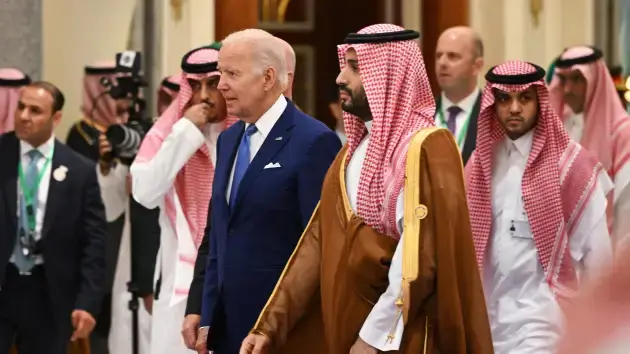1. Massive Economic Downturn
With inflation rising and economic experts predicting a recession on the horizon, the latest announcement by President Biden and Democrat members of Congress against Saudi Arabia's plan to cut oil could be detrimental to the current American economy. In deep blue Democratic states like New York and California, the decision by the administration over Saudi Arabia will lead to even higher gas prices than the national average. Instead of negotiating with the Saudis and finding a solution, the moves by the administration will mean that American gas prices will continue to rise. Additionally, Americans can expect higher prices for commercial airlines and even long flight delays not seen since the Carter administration.
2. Boosts Iran’s Regime & Terror Proxies
With President Biden and Democrat lawmakers reconsidering arms agreements with the Kingdom of Saudi Arabia in the wake of OPEC'S decision to cut oil output, many believe the Islamic Republic of Iran and its terror proxies will get a boost against their most hated rival. With Saudi Arabia closest to Iran and American military bases in the Kingdom, cutting off military aid would signal to the Iranians that America does not support the Saudi government, allowing radical Islamic terror proxies to engage in attacks against the Persian Gulf Arab states. Should the administration go through with its proposed "reevaluation," Iran’s terror proxies, like the Houthis in Yemen, will most likely increase their attacks against Saudi Arabian oil installations, creating more chaos in the Middle East and international oil markets.
3. Destroys Cooperation
Since the U.S. began support of the Saudi monarchy in 1943, the two countries have engaged in a bevy of economic and military cooperation, particularly with the support of radical Islamic terrorism throughout the Middle East. With the Biden administration's plans to cut-off arms and Democrat lawmakers calling for harsh consequences for the Kingdom, any previous economic and military advances created between the two countries will be reversed. Should the administration and Congress enact measures against Saudi Arabia, the Saudi government could retaliate by reducing the already low amount of oil output and cooperation with the U.S. military and intelligence forces. As a result, the U.S. would not have a crucial military and economic presence in Saudi Arabia and will be unable to closely monitor the Islamic Republic of Iran and its terrorist proxies in places like Yemen, Iraq, Syria, and other parts of the region.
4. Even More Oil Reduction
Since President Biden came into office in 2020, his administration has enacted strict measures against America's domestic oil production, making the U.S. reliant on countries like Saudi Arabia to supply oil. With the latest announcement of cuts to oil production and the President's harsh response toward the Kingdom's policy, the Saudis could announce even more cuts to oil production to make the administration and Americans feel the heat over proposed plans to reduce arms sales and other measures. With rising gas prices, limited drilling, and canceling of pipelines, the administration is risking the future of America's energy policy by further ratcheting up tensions, which could backfire tremendously on ordinary Americans at the gas pump. Instead of opening domestic oil drilling in the U.S., the administration hopes that by confronting Saudi Arabia, the risk of upsetting an ally would be outweighed by the possibility of having greater oil output.
5. Pushes the Saudis Toward Russia
Acting against Saudi Arabia could also lead its ruler Mohammed Bin Salman to draw close to Russian President Vladimir Putin and help ease Moscow's current predicament in Ukraine. Since President Biden came into office, the administration engaged in a campaign against Mohammed Bin Salman, declaring him a "pariah" and constantly highlighting the death of Washington Post reporter Jamal Khashoggi. As a result, the Saudi government has engaged with anti-American regimes like Russia. The latest agreement between the two OPEC nations to cut oil supply indicates that Riyadh is moving away from America's influence and towards Putin's. Should the Biden administration enact its measures against Saudi Arabia, Saudis could cement their relations with Moscow, resulting in even more reduction in oil output to the U.S. and its allies.









